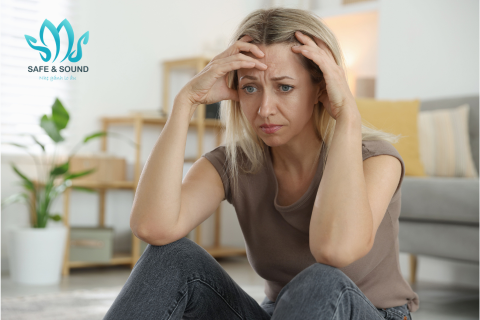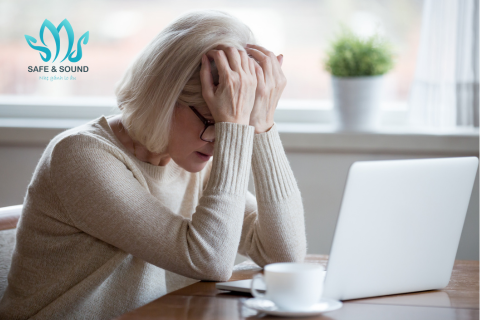Signs of Depression in Menopausal Women: When Hormones and Emotions Change | Safe and Sound
Menopause is a natural stage in every woman's life that usually begins at age 40 (or earlier), but it is also a period of great change both physically and psychologically. Depression in menopausal women is not only due to hormonal changes but also a combination of many psychological, physiological, and environmental factors. In this article, we will learn about the signs of depression in menopausal women and why this stage can easily lead to major psychological changes.
Phi Thuy Linh | Bachelor of Public Health – Mental Health Care Application Safe and Sound
Institute of Medical Technology Applications
1. Hormonal changes and emotional impact

Menopause causes strong hormonal changes in the body, affecting women's psychology
Menopause marks the end of the menstrual cycle and a sharp decline in hormones such as estrogen and progesterone. These hormonal changes can have a direct impact on a woman's psychology and emotions, creating a range of symptoms such as irritability, anxiety and especially depression. When estrogen levels decrease, some areas of the brain that play a role in regulating emotions are also affected, leading to depressive symptoms such as persistent sadness, loss of interest in everything, and a feeling of helplessness.
Estrogen also protects the brain from stress, so when the level of this hormone decreases, the ability to cope with stress also decreases. This is the reason why many women feel psychologically vulnerable and prone to depression during menopause.
2. Signs of depression in menopausal women
Depression in menopausal women can manifest itself through a number of distinct signs. However, due to the complex psychological changes during this period, many symptoms of depression can be confused with normal symptoms of menopause. Below are some common signs of depression that women in menopause often experience:
- Feelings of sadness and hopelessness: One of the most common signs of depression is a persistent feeling of sadness, even hopelessness. Women in menopause may feel depressed and lose interest in activities they once enjoyed. This can seriously affect their quality of life and personal relationships.
- Insomnia: Insomnia is a common symptom during menopause, and it can become a factor that promotes depression. Lack of sleep not only makes the body tired but also increases feelings of anxiety and reduces the ability to solve psychological problems.
- Changes in eating habits: Depression can cause women in menopause to eat irregularly, leading to rapid weight gain or loss. These changes not only affect physical health but also cause changes in psychology, making them feel less confident and worried about their appearance.
- Feelings of anxiety and stress: Anxiety is a major factor leading to depression, especially when women feel out of control over the inevitable changes in their bodies. These feelings of anxiety and stress can persist, increasing the level of depression and affecting other aspects of life.
- Loss of concentration: Depression in menopausal women often causes a decrease in concentration. This can affect work, study and daily activities. Feeling "dreamy" or "empty" in the head is a common sign that many women experience during this stage.
- Feelings of loneliness and lack of social connection: As emotions change and depression sets in, many women may feel lonely and have difficulty maintaining social relationships. This lack of connection can make them feel even more isolated as they cope with psychological problems.
3. Factors affecting depression in menopausal women

Depression in menopausal women is also affected by social factors
Depression in menopausal women is not simply a result of hormonal changes but is also influenced by psychological, social and environmental factors. Some factors that may contribute to the worsening of this condition include:
- Health conditions: Women in menopause often face other health problems such as osteoporosis, cardiovascular disease, or diabetes problems. These problems can create stress and anxiety, thereby increasing the risk of depression.
- Family and work issues: During menopause, many women also face psychological issues related to family, such as raising adult children, caring for elderly parents, or changes in career, rekindling marital feelings. These pressures can make women feel stressed and prone to depression.
- Family history of depression: Women with a family history of depression or other psychological disorders are at higher risk of developing depression during menopause. Genes and genetic factors play an important role in the development of the disease.
- Changes in relationships: Changes in relationships or the loss of a loved one during menopause can create a major psychological shock, increasing the risk of depression. Issues related to self-esteem, loneliness, or loss of belonging can negatively affect mental health.
4. How to treat depression in menopausal women
Depression in menopausal women can be treated effectively if detected and treated promptly. Treatment will depend on the severity of the depression and the patient's overall health. Treatment options include:
- Psychotherapy: Psychotherapy is a very effective treatment for depression, helping women better understand their feelings and thoughts. Cognitive behavioral therapy (CBT) is one of the methods often used by psychologists to help patients identify and change negative thoughts.

- Medication: Antidepressants, especially SSRIs (selective serotonin reuptake inhibitors), can help improve depression in menopausal women by rebalancing chemical levels in the brain.
- Lifestyle changes: Increasing physical activity and maintaining a healthy diet and regular sleep habits are also very good measures to support improving psychological state and help reduce symptoms of depression.
- Social support: Participating in support groups and sharing with friends and family can help women feel encouraged and reduce feelings of loneliness while coping with the disease.
Depression in menopausal women is a common mental health condition that can seriously affect the quality of life if not treated promptly. Understanding the signs and causes of depression during menopause will help women detect it early and seek timely support from psychological experts. If you or a loved one is experiencing symptoms of depression during this period, do not hesitate to see a psychiatrist or psychologist for timely diagnosis and treatment. Taking care of your mental health not only helps you overcome illness but also regain balance and joy in life.
Safe and Sound Clinic - Psychological Support and Family Health
With a team of experienced doctors and experts, Safe and Sound Clinic is a pioneer in providing comprehensive healthcare for you and your family, offering services that cover both medical and psychological care.
"Early Prevention - Timely Support - Long-Term Companion."
If you suspect or encounter any physical or mental health issues, please contact HOTLINE 0964 778 911 (Phone/Zalo, 24/7) for prompt assistance and support!
HOW TO MAKE AN APPOINTMENT
You can schedule an online or in-person consultation with our experts:
- At SnS Clinic - IMT Institute
- Or download and schedule a consultation through the Safe and Sound app to manage and track your appointments anytime, anywhere.
Safe and Sound (SnS) - a part of the Institute of Medical Technology (IMT)
See also:
How do depression symptoms differ in women and men?




